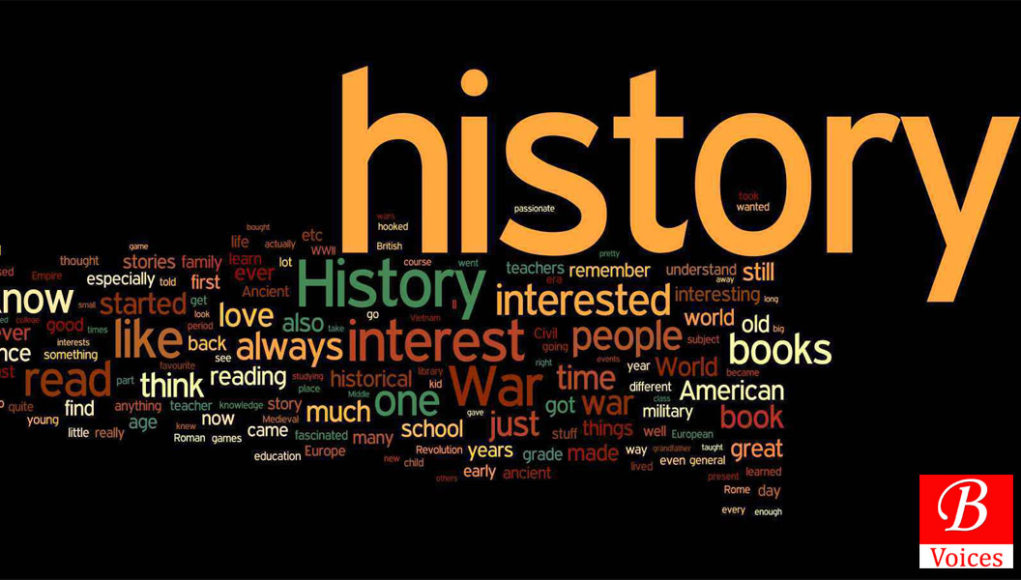Anwar Noor Baloch
It is might be true that some of us dislike studying history or going back to history. It is not must that person should like reading history books. It should be their own determination whether to go to history or not. If history is about refreshing and recollecting thoughts, then someone should not waste his time. How someone can correct the mistakes of the past, if he doesn’t study history?
The history is beyond the collection of thoughts which can be better explained by historians. History helps us to find real, true and genuine men of the past and justifies what made them to become what they became.
Reading the biography book of Adolf Hitler (KEIN KAMPE), where on page 27 he stated that, “the teaching of universal history in what is called the middle schools is still very unsatisfactory”. This phrase has made me pause for a moment and then I began to think that, what can be history about, then. Of course, in our school days, we were forced to memorize the dates of birth of famous leaders, dates of battles, dates of death of famous scientists and many other events.
Read also: Sarajevo and Zlata’s Diary: A Memorable Trip to Bosnia
Further, and most fascinatingly that, if someone studies history, then his objective should be the search and exploration for something and discover the forces that are the causes of those results which appear before our eyes as historical events. I still remember when we were studying at the university where we were given case studies about different companies from Harvard Business School to analyze these cases, that what went wrong with these companies’ profitability. It was founded that such cases were leading us to think in deep at different angles to find out the root causes of why some companies had collapsed. Such case studies had helped to analyze companies’ profiles like their management styles, leadership styles, and culture. It didn’t stop there but had led to critical thinking and to raise a different kind of questions for solutions and recommendations. This is one kind of business and trade history. Where is “Kodak”, in today’s market? Wasn’t the Kodak a big name and a famous brand in the past? What went wrong with it? Here history plays its role. Other brands took lessons from the mistakes of Kodak and started to do differently.
Was not that a history which helped to know about the “industrial revolution” and how it took place? What was the need of such a revolution? A lot of lessons can be learned in such revolutions, that, what was in the past and what can be in the future and for what reasons. Economically, history tells the clashes between socialism and capitalism and it is history that assists to find some great economists such as Adam Smith, Karl Marx, Milton Friedman, John Maynard Keynes, Friedrich August, Elinor Ostrom and many more in the books of history. We may want to know the reason behind some economists who were in favor of the free-market and some were not. History has the answer of such questions. Is it not this can be a good idea to refer to history for such discovery?
It is the history that teaches us about Darwinism and his theory of evolution. It was Darwin’s time, where it was thought that the cell had a very simple structure. Is not this a debatable topic in today’s modern and scientific world?
It can be a valid question to ask that, how history created profound novelists, writers, and authors, such as Jane Austen, Honore de Balzac, William Shakespeare, Fyodor Dostoevsky, Leo Tolstoy, and George Orwell. Of course, history has millions of famous writers from different nations.
Jordan Peterson, the Canadian psychologist and the author of “12 Rules for Life” has rightly said that, “You should read history because it is about you. You are there since ancient in history”. His words and sentences make sense. Referring to history will create a bright future as it teaches what went wrong and how to be corrected.
Coming to the history of the banking sector and ask how those banks worked. What culture those banks practiced, what services were provided, what processes were applied and used and what technology (if it was there) was used? The history records that the first bank in the world was the Taula de la Ciutat, which opened in Barcelona in 1401. Today, the bank even has been redefined, like what Bill Gates says, “Banks are not important but the banking”. What this can be meant for bankers and their customers?
Disclaimer: Views expressed in this article are those of the author and Balochistan Voices not necessarily agrees with them.
Share your comments!








